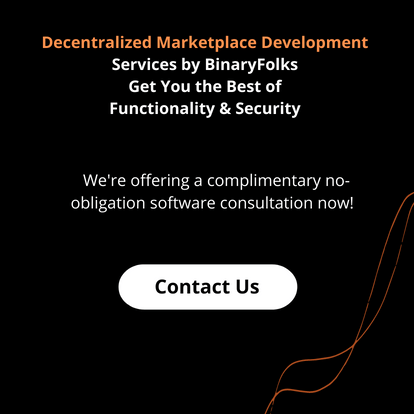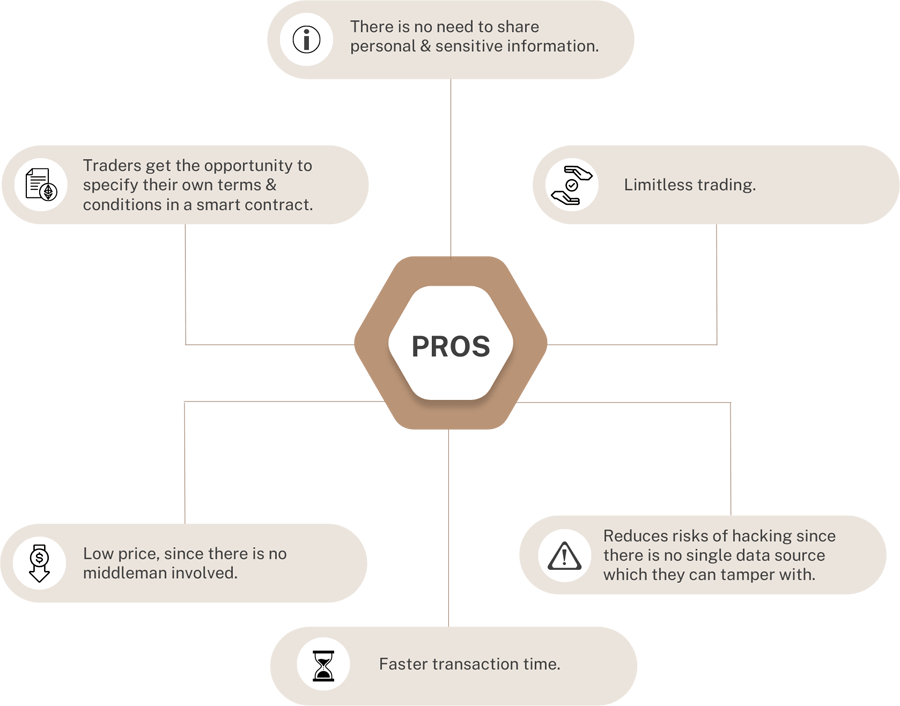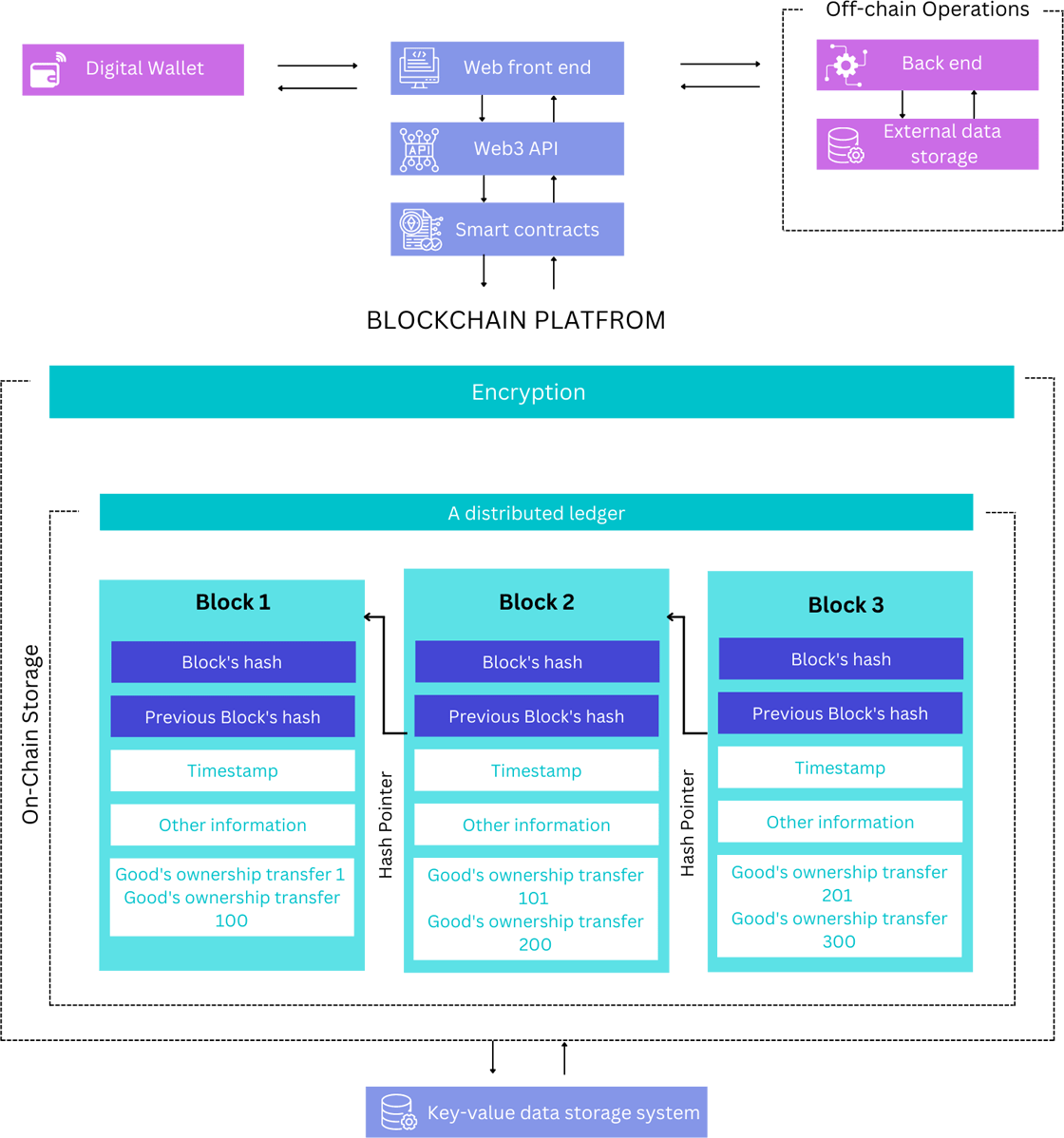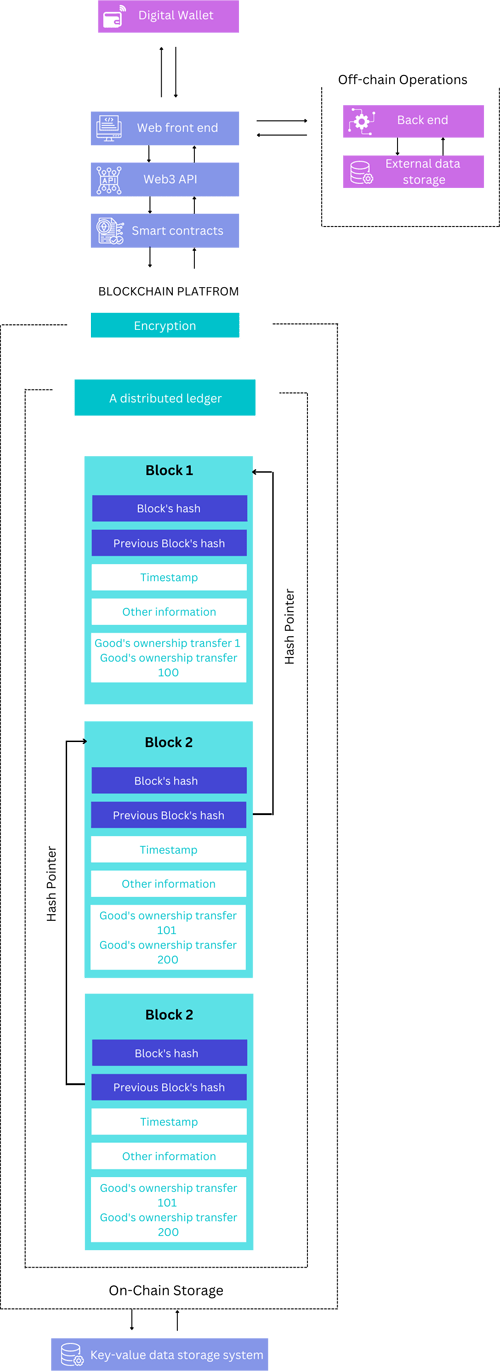Remember the ‘wish’ of having a marketplace that allows middleman free peer-to-peer trading?
That’s what today’s decentralized marketplace is all about. Decentralized marketplaces allow people to interact with and perform transactions both locally & globally without the involvement of any intermediaries, seamlessly. Not just that, it also ensures that both buyers & sellers are on the same page by recording the terms & conditions on a smart contract that self-executes when the agreements are met. Besides that, it also provides 24*7 payment support, so that users can have a hassle-free transactional experience at any point of time.
Well, this was just a brief overview, to know more about what decentralized marketplaces can do for your business, here’s a complete view of it.
What is a Decentralized Marketplace?
To put it simply, a decentralized marketplace is basically an ecommerce platform that:
- 1. Uses Blockchain technology & smart contracts to create a p2p network that allows traders to conduct transactions without third-party interference.
- 2. Enables buyers to check product reviews, origin & history which are stored on the Blockchain network and are immutable, making trading more trustworthy & transparent.
- 3. Provides sellers a personal account to keep a tab on their sales & earnings.
- 4. Offers a wide range of payment options and ensures that transactions occur at one go.
Examples of Decentralized Marketplace
So, before we get into the nitty gritty of developing a decentralized marketplace, let’s first look at the popular marketplaces that are currently dominating the market:

It is a peer-to-peer marketplace for trading NFTs and crypto collectibles.

A marketplace that lists limited art editions and allows users to browse, buy, & sell them, as well as mint their own NFTs.

It is an Ethereum-based community-first marketplace that generously rewards traders & collectors for taking part in the buying and selling process.

A community-owned marketplace where users can participate in the minting, browsing, buying, and selling of NFTs.

It is a decentralized marketplace that lists Ethereum & Binance Smart Chain NFTs for auction, purchase, and sale.
How Do Decentralized Marketplaces Work?
In a typical decentralized marketplace, traders submit their relevant data into it which is stored on the Blockchain network. These data are then encrypted and the access to these data streams are anonymized through Blockchain technology, thus ensuring high data security is maintained across the network. The buyer then transacts through an automated smart contract which controls the entire execution & trading process based on pre-declared agreements. Finally, when both the buyers & sellers agree on the terms & conditions of the smart contract, it self-executes itself and the transaction gets completed. And, then upon completion of the transaction, based on the agreed prices, the involved parties get their shares of tokens.

Benefits of Decentralized Marketplace
Decentralized marketplaces continue to dominate the global market, with a market size of $11.78 billion, but developing a product based solely on market size would be a poor decision if you don’t consider the benefits it can provide for your business.
So, here are the top benefits that a decentralized marketplaces can offer you with:

Enhanced Transparency
Enhanced Transparency
The data stored in the marketplace is distributed across multiple data centers in multiple locations, allowing all network participants with appropriate permissions to access the same information at the same time, ensuring complete transparency.

Saves Transactional Costs
Saves Transactional Costs
Decentralized marketplaces allow for intermediary-free cross-border payments by connecting an infinite number of domestic & international bank ledgers and securely transferring money between them. Thus, resulting in lower costs and a better user experience.

Higher Security & Better Privacy
Higher Security & Better Privacy
Blockchain, the technology that powers decentralized marketplaces, verifies and validates all financial transactions. And, once verified, these data are encrypted and securely stored within the marketplaces, where they cannot be deleted or tampered with later. Thus, reduces the risk of data loss & fraud.

Trading Process Simplification
Trading Process Simplification
Buyers & sellers can easily declare their trading terms and conditions on a smart contract, which executes automatically when the agreements are met. This aids in the automation of trade settlements and the reduction of disputes without the involvement of a third party.
Decentralized Markets – Pros at a Glance

Types of Decentralized Marketplaces
To decide the right decentralized marketplace for your business, you need to first learn about the different types of marketplaces and which one fits your business purpose.
So, to help you plan right, presenting the types of decentralized marketplaces:

By Product Type
This type of marketplace does not typically list a wide range of products, but rather lists products based on their types, which can be classified as follows:
- Services
- Goods
- Raw data & information
- Investments
So, if you know exactly what type of product you want to display on your marketplace, this could be the ideal solution for your business.

By Business Model Type
With respect to business model, decentralized marketplaces can be divided into three types:
- B2C (Business to Consumer) – In this type businesses can provide products ( not restricted to product types) directly to customers/consumers.
- B2B (Business to Business) – In this type businesses can only provide products to businesses.
- C2C (Consumer to Consumer) – In this type, users can directly sell goods to other individuals/users.

By Reach
Decentralized marketplaces can be divided into two types:
- Horizontal Type – In this type, businesses offer a diverse range of products from various manufacturers, both locally and globally, to their customers.
- Vertical Type – In this type, businesses provide the buyer with goods from various manufacturers of the same product type, both locally and globally.
Decentralized Marketplace – Architecture
At BinaryFolks, we help you build:


- Digital wallet for crypto token exchange to carry out transactions at a decentralized marketplace.
- A web front end for sellers and buyers.
- Robust back end to process data stored externally. For instance, product listings.
- Web3 API to connect the web front end with smart contracts.
- Smart contracts to verify marketplace transactions.
- Blockchain encrypts and stores transaction-related data.
- Key-value data storage system to store blockchain metadata.
Decentralized Marketplace – Essential Features
A decentralized marketplace can undoubtedly provide numerous benefits to your business, but only if you choose the right functionalities to include in it.
So, on that note, here’s a list of must-have features to include in your marketplace that will undeniably boost your business efficiency and yield the highest ROI.
BinaryFolks Take on Efficient Decentralized Marketplace Development
Decentralized marketplaces are having all the attention around it these days. While every other software development company in the market currently claims to be pro at decentralized marketplace development, here’s what makes our approach stand out:
Effective Smart Contract Testing
Smart contracts are in charge of the majority of the functioning of decentralized markets, therefore it is critical to perform end-to-end smart contract testing to ensure that the marketplace runs smoothly. And, on that note, here are the steps our dedicated team of testers take to assure end-to-end smart contract testing:
- Functional testing, ensures that the smart contract executes correctly and returns the intended results.
- Integration testing, which validates the interaction of the smart contract with other market modules, proceeds smoothly.
- Performance testing, to determine how smart contracts function under workload in terms of latency.
- Regression testing, to ensure that the introduction of smart contracts has not harmed previously developed modules.


Fool-Proof Security Auditing
Keeping security concerns in mind, we here at BinaryFolks offer our clients the option to independently audit smart contracts before releasing them into production, as once smart contracts are written and released into production, the code cannot be modified.
Financial Impacts of Decentralized Marketplace Development
Now that you have gotten a fair idea what a decentralized marketplace can do for your business, let’s have a look at the cost estimation of these marketplaces as well as how it impacts ROI.
How much does Decentralized Marketplace Development Cost?
The cost of building a decentralized marketplace depends on a lot of factors and to name a few:
- 1.Cost of hiring a development team
- 2.Number & complexity of features you want to include in your product.
- 3.Look & feel of your product.
- 4.Product type
- 5.Type of testing opted for
Apart from the above mentioned factors, there are a bunch of factors that impact the cost of developing a decentralized marketplace. However, if you really want to bind it in a range, decentralized markets cost mostly between $50K – $100K, and even more if you want a more feature-rich and complex product.

What are the ROI factors of Decentralized Marketplace Development?
- 1.Unveils endless opportunities to collaborate with large brands & multiple agencies.
- 2.No third-party intervention.
- 3.Transactions are faster and less expensive when compared to other conventional payment methods.
- 4.Transparent rating & review system for buyers.

What Decentralized Marketplace Development Service are you Looking for?
Benefits of decentralized marketplaces? – Checked
Must-have features to include in your product? – Checked
Types of decentralized marketplaces? – Checked
But, which service can do best justice to your decentralized market development needs? Let’s read ahead:
Decentralized Marketplace Development Consultation
Already have a rough idea of how you want to develop your decentralized market? Get in touch with our dedicated decentralized marketplace consultants to discuss your idea, document the full & functional architectural map of the marketplace, and plan your techstack that suits the best for your business.


Decentralized Marketplace Development Services
Already documented your decentralized marketplace development plan along with the required features? Then our decentralized marketplace development team can help you get started off the process. And, once development is done, the product is handed over to our team of testers, who thoroughly conducts end-to-end testing and ensures that it is bug-free before delivering it to you.
Why Does Developing Your Decentralized Market With BinaryFolks Make For A Wise Choice?
Driven by ex-engineers from Google, Amazon & Salesforce
101% Value For Money (+1 for Our Complimentary Consultation before You Spend Your 1st Dollar!)
Reviews That You Can Verify!
Safeguarded Business With An NDA
Out-Of-The-Box Innovations
Eye For Details
Questions Galore (Until Your Requirement & Our Understanding are mirror copies!)
Insight-Rich Scope Enhancement
Intense Domain Expertise
Close-knit feedback loop
Conclusion
Before wrapping up, let’s have a quick recap:
- 1. Decentralized marketplaces make use of smart contracts & Blockchain technology to deal with traders directly without third-party intervention.
- 2. Decentralized marketplaces offer an array of benefits which includes enhanced transparency & tradeability, better security and resource distribution optimization.
- 3. Decentralized marketplaces can be divided into 3 types:
- By product type
- By business model
- By reach
-
- 4. OpenSea is a popular example of a decentralized marketplace.
- 5. Decentralized marketplaces cost between $50K – $100K, and even more if you want an advanced product
And, now that you have most of the information on decentralized marketplaces, it’s time to put your plan into action and develop a decentralized market that will enhance trust & transparency among parties while transacting.
So, what are you waiting for?
FAQs
More explained in our NFT marketplace development article.






